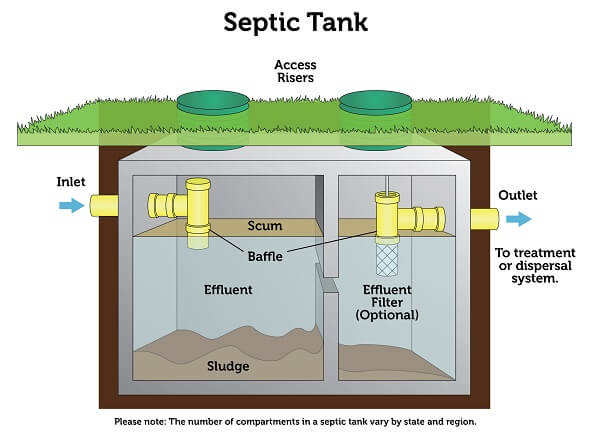In this article, we’ll discuss why your septic tank may still be backing up even after pumping and explore possible reasons for this frustrating issue. We’ll delve into the common causes of septic tank backups, such as clogs, drain field issues, and excessive water usage. Additionally, we’ll provide tips and solutions for resolving the problem, so you can keep your septic system running smoothly. By the end of this article, you’ll have a better understanding of why your septic tank may still be backing up and how to tackle the issue effectively.
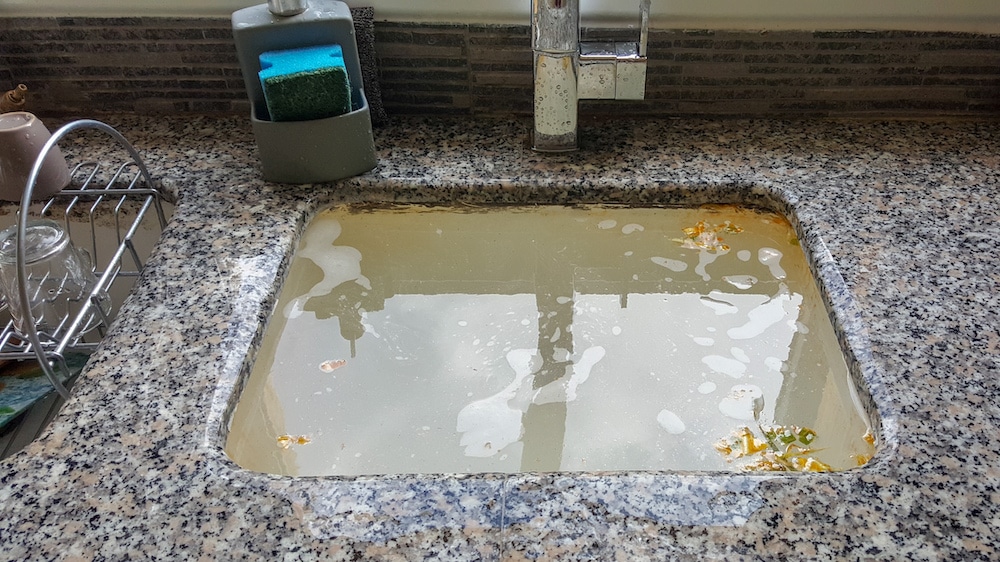
Common Causes of Septic Tank Backing Up
Overload of solids
One common cause of septic tank backup is an overload of solids. When too many solid materials, such as toilet paper, wipes, or feminine hygiene products, are flushed down the toilet or thrown into the sink, they can accumulate in the septic tank. Over time, these solids can build up and create a blockage, leading to the backup of wastewater.
Lack of bacteria
Another cause of septic tank backup is a lack of bacteria. Bacteria are essential for breaking down the solid waste in the tank. If there is not enough bacteria present, the waste will not be properly decomposed, resulting in a buildup of solids and a backup of the system.
Clogged drain field
A clogged drain field can also cause a septic tank to back up. The drain field is responsible for allowing the treated wastewater to be absorbed into the soil. If the drain field becomes clogged with solids or other debris, the wastewater will not be able to properly drain, causing it to back up into the septic tank.
Tree root intrusion
Tree roots can also infiltrate and cause damage to the septic tank system. As the roots grow, they can penetrate the pipes and block the flow of wastewater. This obstruction can result in a backup of the septic tank.
Tank damage or failure
Lastly, tank damage or failure can be a significant factor in septic tank backup. Any structural damage, cracks, or leaks in the septic tank can allow groundwater to enter the tank, overwhelming the system and causing it to back up. Additionally, an old or improperly maintained tank may fail to function correctly, leading to backups.
Effects of a Backed-Up Septic Tank
Foul odors
One of the most noticeable effects of a backed-up septic tank is the foul odor. When the tank is overwhelmed with waste, the decomposition process can be compromised, leading to a strong and unpleasant smell.
Slow draining fixtures
If your sinks, showers, and toilets are draining slowly, it may be an indicator that your septic tank is backing up. The backup can cause a decrease in water flow and result in slow draining fixtures.
Gurgling sounds in pipes
Another sign of septic tank backup is gurgling sounds coming from your pipes. These sounds occur when air bubbles are trapped in the pipes due to a blockage. If you hear gurgling noises when using water fixtures, it could be a sign of a septic tank issue.
Toilet backups
One of the most inconvenient effects of septic tank backup is toilet backups. When the tank is overwhelmed, the wastewater has nowhere to go and can flow back into your toilet bowl. This can lead to messy and unsanitary conditions.
Wastewater pooling in the yard
A clear indicator of a septic tank backup is wastewater pooling in your yard. If you notice soggy areas or standing water near your septic tank, it may be a sign that the system is not functioning properly.
Importance of Regular Pumping
Prevents buildup of solids
Regular pumping of your septic tank is essential for preventing a buildup of solids. As the tank fills up over time, the solid waste settles at the bottom. If not pumped regularly, these solids can accumulate and cause a backup.
Maintains tank volume
Regular pumping also helps to maintain the volume of the septic tank. When the tank is full, it has less space to hold incoming wastewater. This can lead to backups and potential damage to the septic system.
Promotes bacteria growth
Pumping your septic tank removes the excess sludge and allows for the growth of beneficial bacteria. These bacteria are responsible for breaking down the solid waste in the tank. Regular pumping ensures that the bacteria have enough room to thrive and maintain a healthy balance in the tank.
Avoids drain field clogging
By regularly pumping your septic tank, you can prevent the drain field from becoming clogged. When the tank is properly maintained and pumped, it reduces the likelihood of solids and debris entering the drain field and causing obstructions.
Possible Reasons for Backup after Pumping
Incomplete pumping process
Sometimes, a septic tank backup can occur even after pumping. This can happen if the pumping process was incomplete, leaving behind residual sludge and solids. If all the waste is not effectively removed from the tank, it can lead to further backups.
Insufficient time between pumpings
Another reason for backup after pumping is insufficient time between pumpings. If you wait too long to have your septic tank pumped again, the waste can start to accumulate and overwhelm the system, resulting in backups.
Residual sludge and solids
Residual sludge and solids left behind in the tank after pumping can also cause backups. If a thorough job is not done during the pumping process, some sludge and solids may remain, leading to future backup issues.
Septic tank design or size
The design or size of the septic tank may also contribute to backups even after pumping. If the tank is too small for the household’s needs, it can easily become overwhelmed. Similarly, if the tank is not designed properly, it may not allow for adequate flow and drainage, increasing the risk of backups.
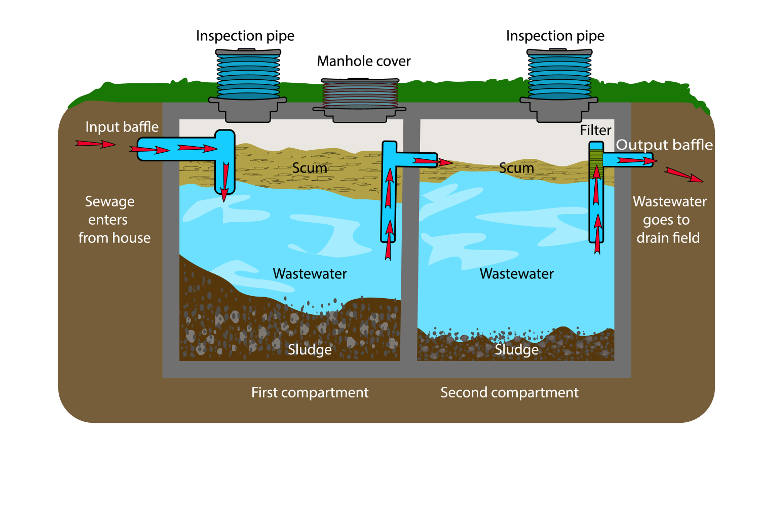
Steps to Resolve Septic Tank Backup
Check for clogs in drain pipes
If you experience a septic tank backup, the first step is to check for clogs in the drain pipes. Blockages in the pipes can cause the backup, so it’s important to identify and clear any obstructions.
Inspect the drain field
Inspecting the drain field is also crucial when resolving a septic tank backup. If the drain field is clogged or saturated with wastewater, it may need to be repaired or replaced. A professional septic contractor can assess the condition of the drain field and recommend the necessary steps to resolve the issue.
Utilize bacterial additives
Using bacterial additives can be beneficial in restoring the proper balance of bacteria in the septic tank. These additives help enhance the decomposition process and reduce the buildup of solids. However, it’s important to use additives that are specifically designed for septic systems and follow the instructions provided.
Repair or replace damaged tank
If the septic tank itself is damaged or failing, it may need to be repaired or replaced. Structural issues, cracks, or leaks in the tank can contribute to backups. A professional septic contractor can assess the condition of the tank and recommend the appropriate solution.
Preventive Measures to Avoid Future Backup
Regular maintenance and pumping
To avoid future septic tank backups, regular maintenance and pumping are essential. Regular pumping helps remove the excess sludge and maintains the proper functioning of the system. Additionally, scheduling regular inspections by a professional can help identify and address potential issues before they become major problems.
Proper household waste disposal
Proper disposal of household waste is crucial in preventing septic tank backups. Avoid flushing items such as wipes, feminine hygiene products, or excessive toilet paper down the toilet. These items can accumulate in the tank and lead to blockages. It’s important to only flush human waste and toilet paper.
Water conservation practices
Conserving water can also help prevent septic tank backups. Excessive water usage can overload the system and lead to backups. Be mindful of water-consuming activities such as long showers or running faucets unnecessarily.
Avoidance of chemical additives
It’s important to avoid the use of chemical additives, such as drain cleaners or excessive detergents, in your septic system. These chemicals can disrupt the natural balance of bacteria in the tank and contribute to backups. Opt for septic-safe products and limit the use of harsh chemicals.
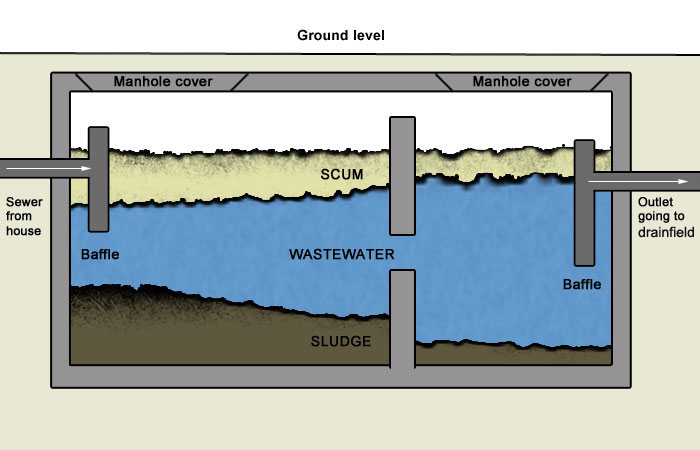
Signs that Indicate Professional Help is Needed
Persistent backup despite efforts
If you are experiencing persistent backups despite taking preventive measures, it may be an indication that professional help is needed. A professional septic contractor can identify the underlying issues and provide effective solutions.
Strong sewage odors in the house
Strong sewage odors inside your house are another sign that you may need professional help. These odors can indicate a significant issue with your septic system and should not be ignored.
Visible signs of tank damage
Visible signs of tank damage, such as cracks, leaks, or collapse, necessitate professional assistance. Tank damage can contribute to backups and requires professional expertise to repair or replace the tank.
Frequent drain field issues
If you are frequently experiencing drain field issues, it’s a sign that your septic system may need professional attention. Frequent backups or slow draining fixtures can indicate problems with the drain field that a professional can assess and repair.
Benefits of Hiring a Professional
Expertise and experience
Professional septic contractors have the necessary expertise and experience to effectively resolve septic tank backups. They are trained in septic system maintenance, repairs, and installations, ensuring that the problem is addressed efficiently and correctly.
Efficient problem diagnosis
A professional can accurately diagnose the cause of the septic tank backup and determine the appropriate solution. They have the knowledge and tools to identify underlying issues that may not be apparent to a homeowner.
Proper equipment and tools
Septic system repair requires specialized equipment and tools that professionals possess. Having access to the right tools ensures that the repair or replacement process is done correctly and efficiently.
Compliance with regulations
A professional septic contractor is familiar with local regulations and codes regarding septic systems. Hiring a professional ensures that the work done on your septic system meets all necessary regulations and requirements.
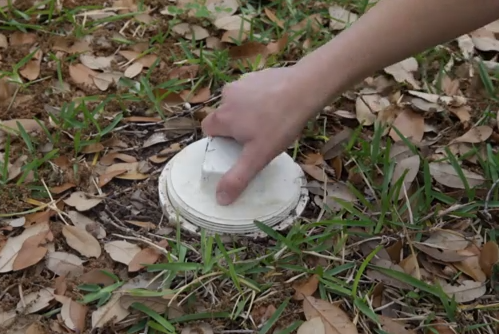
Costs Involved in Resolving Septic Tank Backup
Pumping fees
The cost of pumping your septic tank can vary depending on the size of your tank and the location. Generally, pumping fees can range from $200 to $400, but it’s important to check with local septic service providers for accurate pricing.
Repair or replacement costs
The costs for repairing or replacing a septic tank can vary significantly based on the extent of the damage and the size of the tank. The average cost ranges from $2,000 to $5,000, but it’s crucial to obtain quotes from multiple contractors for an accurate estimate.
Labor charges
Labor charges for septic system repairs or replacements depend on the complexity of the job and the time required. It’s advisable to consult with a professional to determine the labor charges for your specific situation.
Additional expenses for permits
Depending on your location, there may be additional expenses for permits required for septic system repairs or replacements. Check with local authorities to ensure compliance and factor in any permit costs into your budget.
Conclusion
Understanding the causes of septic tank backup is crucial in preventing and resolving this issue. Overload of solids, lack of bacteria, clogged drain fields, tree root intrusion, and tank damage are common causes of backups. The effects of a backed-up septic tank include foul odors, slow draining fixtures, gurgling sounds in pipes, toilet backups, and wastewater pooling in the yard.
Regular pumping helps prevent backups by preventing the buildup of solids, maintaining tank volume, promoting bacteria growth, and avoiding drain field clogging. However, backups can still occur due to incomplete pumping, insufficient time between pumpings, residual sludge and solids, or septic tank design or size issues.
To resolve a septic tank backup, it is important to check for clogs in drain pipes, inspect the drain field, utilize bacterial additives, and repair or replace a damaged tank if necessary. Preventive measures such as regular maintenance and pumping, proper household waste disposal, water conservation practices, and avoidance of chemical additives can help avoid future backups.
If persistent backups, strong sewage odors, visible tank damage, or frequent drain field issues occur, professional help is needed. Hiring a professional provides expertise, efficient problem diagnosis, proper equipment and tools, and compliance with regulations. Costs involved in resolving septic tank backup include pumping fees, repair or replacement costs, labor charges, and additional expenses for permits.
Investing in proper septic system care saves money in the long run by preventing costly repairs and replacements. By understanding and proactively addressing septic tank backup issues, you can ensure the efficient and reliable functioning of your septic system.
